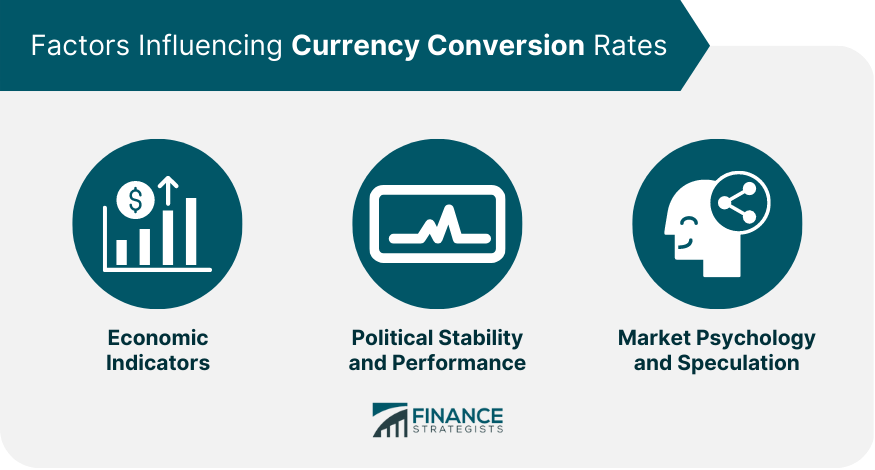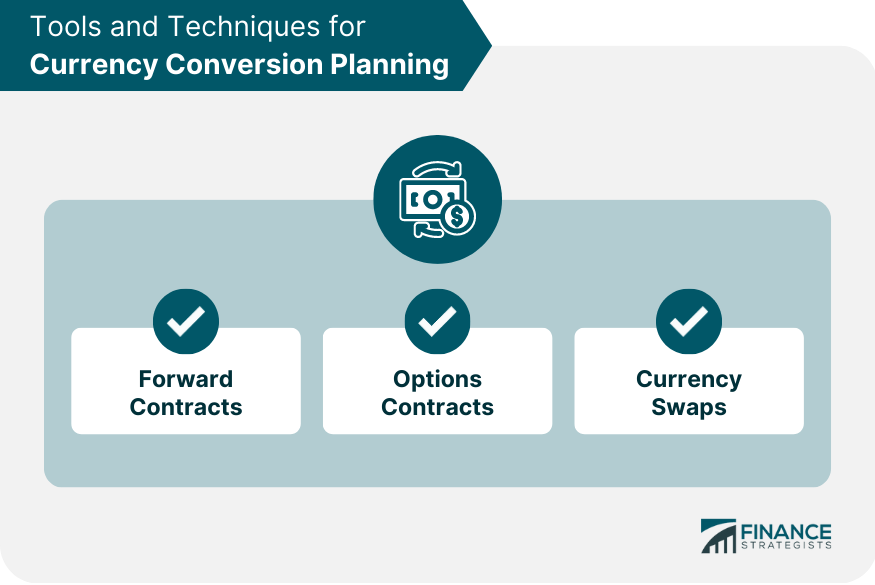Currency conversion planning is essential for businesses operating in the global market. Understanding the process and factors influencing currency conversion rates can help businesses manage risks, reduce costs, and increase profits. Currency conversion is the process of exchanging one currency for another based on the prevailing exchange rate. It is crucial for businesses engaged in international transactions as it impacts their costs, revenues, and profitability. Currency conversion planning is vital for businesses to minimize exchange rate risks, optimize financial decisions, and maintain competitiveness in the global market. It also aids in budgeting and forecasting, enabling businesses to make informed strategic decisions. Understanding the factors that influence currency conversion rates helps businesses manage risks and make informed decisions. This section outlines key economic, political, and market factors that affect exchange rates. Economic indicators, such as inflation rates, interest rates, and GDP, play a significant role in determining currency conversion rates. By closely monitoring these indicators, businesses can predict currency fluctuations and plan accordingly. Political stability and performance can directly impact exchange rates. Businesses should consider political risks when making currency conversion plans to safeguard against potential currency fluctuations due to political changes. Market psychology and speculation can influence currency conversion rates by affecting supply and demand. Monitoring market sentiment and understanding how it impacts exchange rates can help businesses make informed decisions regarding currency conversion planning. Several tools and techniques can assist businesses in managing currency conversion risks. This section will discuss forward contracts, options contracts, currency swaps, futures contracts, and exchange-traded funds (ETFs). Forward contracts allow businesses to lock in a specific exchange rate for a future transaction. This helps mitigate exchange rate risks and provides certainty for budgeting purposes. Options contracts grant businesses the right, but not the obligation, to exchange currencies at a predetermined rate. This offers flexibility and protection against adverse currency movements while allowing businesses to benefit from favorable exchange rate fluctuations. Currency swaps involve exchanging principal and interest payments in different currencies. They help businesses manage currency risk and reduce borrowing costs by accessing more favorable interest rates in foreign markets Effective currency conversion risk management is crucial for businesses operating in the international market. This section will cover identifying and assessing risks, developing a risk management strategy, and implementing and monitoring the strategy. Understanding the potential currency risks faced by a business is the first step in managing them. By identifying and assessing risks, businesses can develop strategies to mitigate adverse effects on their financial performance. Developing a comprehensive risk management strategy, including natural and financial hedging techniques, is essential for minimizing currency conversion risks. This allows businesses to maintain financial stability and predictability in the face of currency fluctuations. Once a risk management strategy is in place, businesses must regularly monitor and adjust their approach as needed. Continuously reviewing and updating the strategy ensures that it remains effective in managing currency conversion risks. Effective currency conversion planning offers numerous benefits for businesses engaged in international trade. These benefits include cost reduction, minimized currency risks, enhanced competitiveness, and improved financial stability. By managing currency conversion risks effectively, businesses can reduce costs and increase profits. This ensures the long-term financial success of the business in the global market. Effective currency conversion planning helps businesses minimize the impact of currency fluctuations on their operations. This ensures that businesses can maintain their financial stability despite budget. Currency conversion planning allows businesses to take advantage of favorable exchange rates and minimize the impact of unfavorable ones. This enhances their competitiveness in the global market and improves their overall business performance. With a well-implemented currency conversion plan, businesses can achieve greater financial stability and predictability. This helps them make better strategic decisions and invest more confidently in their growth and expansion. Successful currency conversion planning can benefit businesses of all sizes and types. This section will explore case studies of international corporations, small and medium-sized enterprises (SMEs), and nonprofit organizations that have effectively managed currency conversion risks. Many multinational corporations have implemented effective currency conversion planning strategies to navigate the challenges of global markets. These corporations have used a combination of tools and techniques to minimize risks and maximize profits, enabling them to maintain their competitive edge in the global marketplace. SMEs that engage in international trade also benefit from currency conversion planning. By effectively managing currency risks, these businesses can maintain their financial stability, reduce costs, and expand their global presence. Nonprofit organizations operating internationally face currency conversion challenges similar to those faced by businesses. Effective currency conversion planning helps these organizations ensure that their funds are efficiently allocated and utilized, maximizing the impact of their programs and services. Currency conversion planning is the process of strategizing how to convert one currency into another at the most favorable exchange rate. It involves considering various factors, such as market trends, political events, and economic indicators, to make informed decisions on foreign exchange transactions. Effective currency conversion planning requires the use of appropriate tools and techniques, such as currency converters, market analysis tools, and risk management strategies like forward contracts and currency hedging. With these tools and techniques, businesses and individuals can reduce currency risks, lower costs, and maximize the value of their foreign currency transactions. Proper currency conversion planning is essential for businesses engaged in international trade to remain competitive in the global market. By mitigating currency risks and optimizing their foreign currency transactions, businesses can improve their profitability and expand their global reach. Similarly, individual travelers can save money and avoid unfavorable rates by conducting research on exchange rates, fees, and timing their currency exchanges.What Is Currency Conversion Planning?
Factors Influencing Currency Conversion Rates
Economic Indicators
Political Stability and Performance
Market Psychology and Speculation

Tools and Techniques for Currency Conversion Planning
Forward Contracts
Options Contracts
Currency Swaps

Managing Currency Conversion Risks
Identifying and Assessing Risks
Developing a Risk Management Strategy
Implementing and Monitoring the Strategy
Benefits of Effective Currency Conversion Planning
Cost Reduction and Increased Profits
Minimized Currency Risks
Enhanced Business Competitiveness
Improved Financial Stability and Predictability
Case Studies of Successful Currency Conversion Planning
International Corporations
Small and Medium-Sized Enterprises
Nonprofit Organizations
Conclusion
Currency Conversion Planning FAQs
Currency conversion planning involves strategizing how to convert one currency into another at the most favorable exchange rate.
It helps individuals and businesses avoid unfavorable exchange rates, reduce currency risk, and maximize the value of their foreign currency transactions.
Some of the commonly used tools for currency conversion planning include currency converters, market analysis tools, and financial news sources.
Techniques such as forward contracts, currency hedging, and limit orders can be used to mitigate risks associated with currency conversions.
Anyone who deals with foreign currencies, including international travelers, import/export businesses, and investors, can benefit from currency conversion planning.
True Tamplin is a published author, public speaker, CEO of UpDigital, and founder of Finance Strategists.
True is a Certified Educator in Personal Finance (CEPF®), author of The Handy Financial Ratios Guide, a member of the Society for Advancing Business Editing and Writing, contributes to his financial education site, Finance Strategists, and has spoken to various financial communities such as the CFA Institute, as well as university students like his Alma mater, Biola University, where he received a bachelor of science in business and data analytics.
To learn more about True, visit his personal website or view his author profiles on Amazon, Nasdaq and Forbes.











